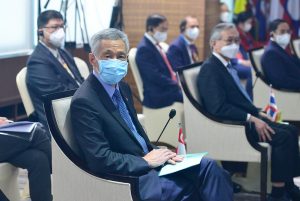Singapore’s Foreign Minister says the Association of Southeast Asian Nations (ASEAN) is working to speed up its much-criticized five-point consensus for addressing the ongoing crisis in Myanmar.
“We recognize that implementation of the Five-Point Consensus has been slow and a little disappointing,” Vivian Balakrishnan said yesterday, in written replies to questions from members of parliament.
The Myanmar military’s seizure of power on February 1 has tipped the country into what looks likely to be a protracted crisis: protests against the military junta have taken place for the past five months, and resistance to its rule is taking increasingly violent forms. According to the Assistance Association for Political Prisoners, nearly 900 people have been killed by the security forces since the coup, and more than 6,000 have been arrested, of which 5,094 remain in detention.
After a special summit in Jakarta on April 24, the 10 ASEAN member states announced five points of consensus for resolving the country’s state of grinding emergency. The five points were the cessation of violence; “constructive dialogue” between the various parties; the appointment of an ASEAN special envoy to mediate in the dialogue process between various parties in the country; the facilitation of humanitarian aid; and the deployment of the special envoy to Myanmar to meet with the various contending parties.
But ASEAN leaders failed to agree on a time frame for the implementation of the consensus, and ASEAN’s progress has been slow, even on what would appear to be the most straightforward point of consensus: the appointment of a special envoy.
Balakrishnan said yesterday that Singapore was “working within ASEAN to expedite this process, with a view to alleviate the humanitarian situation, cease the violence in Myanmar, and set it back on the path of direct negotiation by all stakeholders that will lead to normalcy, peace, and stability for the long term.” He added that ASEAN would not waver in its commitment to implement the five-point consensus, although he said it would not be “quick or easy.”
However, it is unclear whether ASEAN’s implementation of its five points will succeed due to will and effort alone. It is surely the case that Southeast Asian governments could be acting with more outward urgency, but ASEAN’s anemic response to the military takeover in Myanmar and the junta’s bloody crackdown on protesting civilians also to large extent reflects deep differences of principle between its 10 member states.
Some nations, including Indonesia, Malaysia, and Singapore, have been relatively vocal about the destructive turn of events in Myanmar, while Vietnam, Thailand, Cambodia, and Laos have taken a more hands-off approach, fearful perhaps of setting a precedent of intervention in member states’ “internal affairs.”
These divergences were on display last month when the United Nations General Assembly overwhelmingly approved a resolution calling for the world to stop to the flow of arms to Myanmar and urging the military to reverse its coup and release political prisoners. Indonesia, Malaysia, Singapore, the Philippines, Vietnam, and Myanmar’s U.N. Ambassador Kyaw Moe Tun, who remains loyal to the ousted civilian government, voted in support of the resolution, while Brunei, Cambodia, Laos, and Thailand abstained. (Only one nation, Belarus, voted against it.)
According to a recent report by Japan’s Kyodo News, such disputes may also be holding back the appointment of a special envoy. The report alleges that ASEAN member states have settled on three nominees: Hassan Wirajuda, a former Indonesian foreign minister; Virasakdi Futrakul, a veteran Thai diplomat and former deputy foreign minister; and Razali Ismail, a Malaysian who was a U.N. special envoy for Myanmar in the 2000s. Citing ASEAN diplomatic sources, Kyodo claims that each of the three candidates is being pushed by their respective government, and that the choice “appears to have become intertwined with the domestic and strategic agendas of the nominating countries.”
On top of internal disagreements, there is the sheer obduracy of Sen. Gen. Min Aung Hlaing and his junta. Shortly after the April 24 meeting, the military government announced that the implementation of the “five-point consensus” would have to wait until it had achieved “the stability and security of the country.”
Early last month, Erywan Pehin Yusof, Brunei’s second foreign minister, visited Myanmar and met with Min Aung Hlaing, submitting a list of nominees for the special envoy, but there has been no official response from the junta about its choice.
Given their lack of influence over the military government, and in the absence of anything better, most outside governments have expressed their support for ASEAN’s pathway to a resolution of the crisis. But time is of the essence, and with every day that it fails to push forward its five-point consensus, the Southeast Asian organization is showing that it has neither the means nor the will to resolve Myanmar’s complex and ever-deepening political crisis.

































